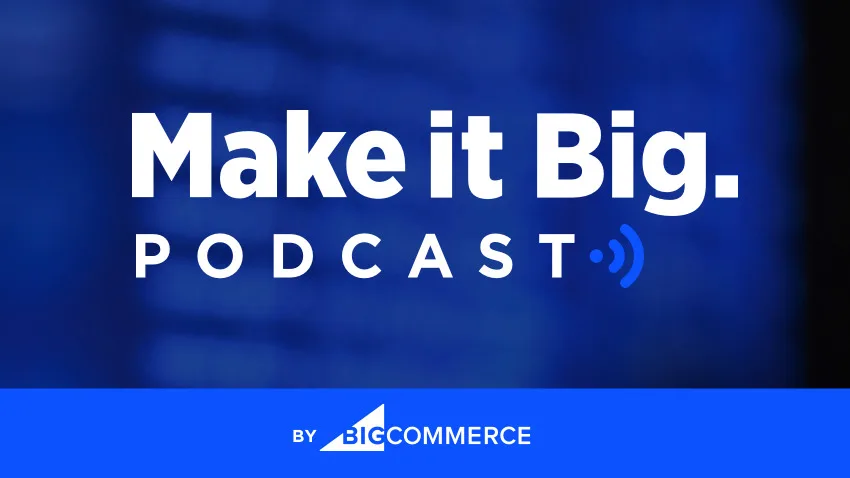
Ecommerce insights on the go
Tune in to the Make it Big Podcast — our thought leadership audio series for retailers, entrepreneurs and ecommerce professionals. You'll get expert insights, strategies and tactics to help grow your business.

4 Ways to Differentiate Your Emerging Ecommerce Brand


4 Ways to Differentiate Your Emerging Ecommerce Brand
Get The Print Version
Tired of scrolling? Download a PDF version for easier offline reading and sharing with coworkers.
A link to download the PDF will arrive in your inbox shortly.
Your new company features a great product and there’s genuine hope and excitement among your team about the days ahead. The challenge is now around how to differentiate your brand among the sea of ecommerce competitors and alternative options. There are over 7.1 million ecommerce sites currently live with more being created every day.
This is a topic that, as a branding company, we are very passionate about. In our eyes, “branding” is really just another term for “differentiation.”
Below, we’ve put together a list of strategies our team has seen to be effective in helping brands we service stand out from the crowd.
Embrace Your No. 1 Differentiator: Yourself
Aside perhaps from the quality of products you offer, the best thing your company has going for it is its culture. You and your people are exclusive to your company, so that becomes an immediate differentiator that no other company can claim to have.
By leaning into the cultural DNA your company offers, it creates a unique appeal that no other competitor can match.
Customers are not just buying your product; they’re buying you. If they feel good about purchasing from a company that has similar passions and outlooks, they are effectively “buying in” to your brand.
We’ve seen companies that are emotionally ambivalent about their products suffer from an equal amount of ambivalence from potential customers. Your excitement begets excitement from others!
How can you emphasize your culture?
Demonstrate the values that are reflective of your company’s mission statement in everything from marketing materials to product packaging.
Offer a live chat feature on your site that allows customers to always get customer support, either via email or phone. This approach also helps to differentiate your company from competitors since other sites might offer just email or nothing at all. If you provide a live chat option and the other site doesn’t, that becomes a differentiator in and of itself. (Pro Tip: Make sure the tone of customer service matches your brand.)
Offer an exclusive community experience for customers who subscribe to your mailing list/newsletter. This could take the form of exclusive discount codes, access to members-only sales or giveaways, and so on. Again, this is something that no other competitor can match.
Leverage your company’s online presence with an influencer marketing campaign. This allows for virtually endless opportunities to feature your business in front of new audiences since there are a growing number of influencers who have a large social media following. For example, if your product is focused on mothers and babies, then perhaps you could partner with a popular parenting blog or Instagram account that targets the same audience.
Don’t Skimp on the Polish
When you’re excited about your brand’s ability to impact the lives of others, it should show in every possible visual aspect. It’s one thing for you and your people to care, but it’s another thing for your marketing to demonstrate that.
When you “phone it in,” it shows. It’s worth spending money on the look and feel of your marketing materials, images, videos, etc. because it can send a signal that you care about quality.
How do you demonstrate polish?
Don’t underestimate the importance of your website design.
If you don’t have the funds to hire a full-time developer, then it could be worth outsourcing to a design agency. Even if you’re attempting to do everything in-house, make sure that every single element of your site is professional and well designed.
Invest in quality photography for marketing materials/packaging.
Research has shown that people are more likely to trust an image over text alone. Even if you can’t afford to hire a full-time photographer or have the resources to outsource photos to a professional agency, there are still affordable options available. Look at groups on social media that connect local photographers with people who need their work done cheaply.
Don’t skimp on the details of your packaging.
This is where the bulk of your “branding” will go, so take time to ensure that it looks fantastic. Have fun with this process since you’ve already demonstrated your ability to invest in what matters.
Make sure all printed materials are high quality and easy to read.
Again, customers aren’t just buying a product, they’re buying your brand. Your marketing materials should help reaffirm the decision to buy from you, not create more reasons for them not to purchase.
Your website should feel professional and not “under construction” or a placeholder for a larger site redesign to come later.
Think of it this way, your website is the face of your company that most people will see. If your site isn’t communicating that you’re ready to go, then customers will move on. You can achieve a polished website in many ways: working with an agency or having a development team in-house are promising, but can often cost quite a bit of money in the long run.
Many platforms, on the other hand, allow you to create a beautiful website all on your own, like BigCommerce. Their tools and integrations can help create polished websites with ease.
Keep your messaging tight.
If you don’t have a lot to say about your brand or are struggling to convey the value proposition behind what you offer, perhaps you should wait. Companies that actively engage in a dialogue with their customers sell more because they’re able to connect on a deeper level and demonstrate an understanding for what their customers want.
Trust is key.
Ensuring trust in a business is important in this age of ecommerce, it’s important to offer your customers secure options while also answering questions they may have and demonstrating things like return policies.
Does this approach to a more polished presentation require you to pay more and cost more time? Absolutely, but not as much as the alternative will cost you. While you can certainly achieve success with the quality of your products and service alone, the emotional effect of a well-crafted presentation is what attracts and keeps more buyers.
Show What Other People Love About You
As a new brand, you’re always looking for more customers to build momentum. One of the ways to keep the flow going is to highlight what your first real customers love about you and your products. Testimonials and reviews are wonderful, but don’t forget to add visual elements to accentuate the effect. When you show real people excited about what your brand offers, it demonstrates that there’s a community and vibrant culture behind your business.
This approach also helps relieve the pressure on new buyers who may be faced with a purchase decision based on little information. When brands can demonstrate their value proposition clearly and concisely, then customers are better equipped to make decisions.
Try engaging with your customers online as well, whether they’re answering questions about your products in Facebook groups or on Amazon, include the people who love what you do when they make a comment online. It takes one minute to ask them if it would be okay to use their name and company affiliation when sharing it on social media or elsewhere, but it helps customers feel like they’re part of the brand. According to Womply, businesses that respond to just one customer review earn 4% more revenue on average.
You should also add your social media profiles (especially Instagram) to your website. Many people look at a company’s site before purchasing but also want to know what kind of person or business is behind it all, whether that’s an individual or team. Social media profiles offer a glimpse into your company’s culture and can help build relationships with new customers.
We are big supporters of showing other customers using a brand’s product. There are multiple tools that integrate images from your social media accounts onto your website, and there are other ways you can visually creatively convey these examples.
This is what “Social Proof” is all about: When consumers see others enjoying your product, they should get on the train as well.
Learn How to Tell Your Brand Story
Marketing is about more than just getting the attention of prospects. It’s also about giving them a reason to trust you through knowing you better. Your company blog is an excellent way to share what makes your product special, along with other types of content that help educate or entertain people who are considering buying from you.
Think of your blog as a means to build up your business as the go-to resource for what matters to your customer base. On average, companies who blog produce 67% more leads per month. If you have a blog, great. If not, start one and take advantage of this opportunity to get in front of people who want to learn more about your products and company culture.
You’ll also find that blogging builds trust with customers because it shows them you know what you’re doing and adds value they might miss elsewhere.
In addition, consider using a video “About Us” page. This is an opportunity to create a more personal relationship with your customers and give them a chance to get to know you and the people they might be buying from. It also makes it easier for new viewers to feel connected and trust your brand because at least they know who it is that’s speaking.
In the age of social media, your personal presence is an extension of the brands you represent. In fact, over one billion people use Instagram every month. If you aren’t on at least one active social media platform, think about what you’re missing out on and how much more effective your business could be with a presence there.
The Final Word
These concepts are critical to help differentiate your brand from an ever-growing competitive jungle. How they apply specifically to your brand and your product line should be an area of intense focus. Our team at EYStudios is happy to help you discern a practical strategy that will set your emerging ecommerce brand up for long-term profitability.

Eric Yonge is the CEO of EYStudios in Atlanta, Georgia — a full-service marketing, design, and development agency. Eric has been working in the ecommerce sphere for 23 years and is regarded as an expert by many in the field. In addition to improving ecommerce brands, Eric is passionate about drawing, comic books, and above all, his family.


